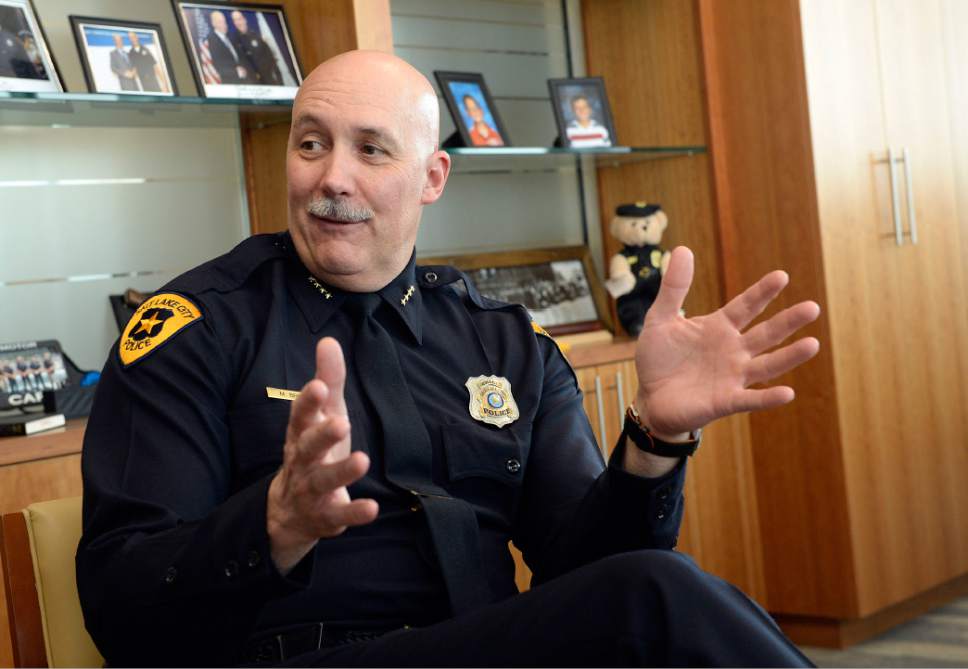This is an archived article that was published on sltrib.com in 2017, and information in the article may be outdated. It is provided only for personal research purposes and may not be reprinted.
President Donald Trump's message regarding immigration makes it harder for local police to do their job, Salt Lake City's police chief said this week.
During a visit Monday with The Salt Lake Tribune's editorial staff, Chief Mike Brown said Trump's message not only frightens people in immigrant communities, but also concerns and impacts the police force.
"We do not want to do immigration enforcement," Brown said. "It's like doing tax enforcement for tax law. We would never go knocking on doors to tell people they haven't paid their taxes. It's not criminal law."
Brown joined other police chiefs from around the country for a meeting in Washington, D.C. a few weeks ago with Trump and Homeland Security Secretary John Kelly. While he appreciated the opportunity to give the nation's leaders feedback, Brown said, the meeting left a "void" as to where undocumented immigrants would be held.
"We are struggling to put [alleged criminals] in jail right now with the limited space," he said.
The logistics and staffing required for mass deportation "is just not there," Brown said, noting that even with the 463 officers on the city's police force, there are times during the summer when officers scheduled for the afternoon shift begin work 20 to 30 calls behind.
"If we were forced to do immigration, we would never get to the calls for service that we truly need to do to represent and to serve the citizens here in Salt Lake City. We would just never get to it," he said. "I would hate to think that you would have people hiding in their basement when they called 911 and for somebody to get on the phone and say, 'I'm sorry; we're all doing immigration enforcement. We'll be there when we can.' " He added that there is no reason for victims to be afraid to report crimes to police due to their immigration status, because SLCPD officers are not Immigration and Customs Enforcement agents.
While Salt Lake City doesn't consider itself a "sanctuary city" (a term with no clear definition, but which generally refers to jurisdictions that refuse to work with federal officials on immigration matters), it is a welcoming city, Brown said. Officers from the city's police force do not ask about a person's immigration status, and it is not something for which the city keeps records.
"We work very well with our federal agencies," Brown said. "There's nothing we wouldn't share with them; we just don't have the information they want."
Once a person is booked into the Salt Lake County jail, Brown said, officers there investigate immigrant status and report it to ICE.
ICE does not typically tip off local agencies when planning to make arrests, Brown said, though SLCPD has a local point of contact for ICE if communication is needed.
Brown also expressed concern about bringing back the Secure Communities method of policing immigrants, in which ICE, beginning in 2008, could request local agencies detain jailed undocumented immigrants for up to 48 "extra" hours (excluding weekends and holidays) to give ICE agents the opportunity to interview them, the ICE website says. The policy was replaced in 2015 by Priority Enforcement Program, which defined specific types of criminals as top priority for deportation. But in a Feb. 20 Department of Homeland Security memo, the Secure Communities method was reinstated.
The method leaves police at risk for lawsuits, Brown said, and violates Fourth Amendment rights and rights for due process.
Trump was scheduled to address a joint session of Congress on Tuesday night and invited three relatives of people who had been killed by illegal immigrants as his guests, according to the Los Angeles Times, indicating illegal immigration would be a major topic in his speech. mnoble@sltrib.com
Twitter: @mnoblenews



